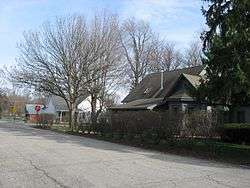New Augusta Historic District
|
New Augusta Historic District | |
 Houses in New Augusta, March 2011 | |
  | |
| Location | Roughly E. 71st St., E. 74th St., Coffman Rd., New Augusta Rd., Indianapolis, Indiana |
|---|---|
| Coordinates | 39°53′02″N 86°14′09″W / 39.88389°N 86.23583°WCoordinates: 39°53′02″N 86°14′09″W / 39.88389°N 86.23583°W |
| Area | 46 acres (19 ha) |
| Architect | Enos, E.Y. & Co. |
| Architectural style | Bungalow/craftsman, Italianate, Gabled ell |
| NRHP Reference # | 89000780[1] |
| Added to NRHP | July 12, 1989 |
New Augusta Historic District is a national historic district located at Indianapolis, Indiana. It encompasses 114 contributing buildings, 1 contributing structure, and 1 contributing object in a railroad oriented village in Indianapolis. The district developed between about 1852 and 1939, and includes representative examples of Italianate and Bungalow / American Craftsman style architecture. Notable contributing buildings include the Odd Fellows Building (c. 1890), Hopewell Evangelical Lutheran Church (c. 1859, c. 1880), Salem Lutheran Church (1880), and New Augusta Depot (c. 1890).[2] It is located east of Augusta.[2]
It was listed on the National Register of Historic Places in 1989.[1]
Painter Florence Smithburn was a native of New Augusta.[3]
References
- 1 2 National Park Service (2010-07-09). "National Register Information System". National Register of Historic Places. National Park Service.
- 1 2 "Indiana State Historic Architectural and Archaeological Research Database (SHAARD)" (Searchable database). Department of Natural Resources, Division of Historic Preservation and Archaeology. Retrieved 2016-08-01. Note: This includes Susanne T. Rollins (June 1987). "National Register of Historic Places Inventory Nomination Form: New Augusta Historic District" (PDF). Retrieved 2016-08-01., Site map, and Accompanying photographs
- ↑ Judith Vale Newton and Carol Ann Weiss (2004). Skirting the Issue: Stories of Indiana's Historical Women Artists. Indiana Historical Society Press. ISBN 0-87195-177-0.

